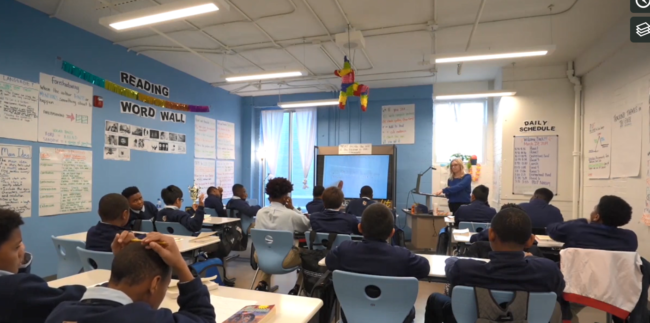04.08.19Lessons in Show Calling from Sarah Wright’s Classroom

Two weeks ago I posted this clip of Sarah Wright teaching English at Chattanooga Prep. It showed, to me at least, the indelible connection between order and joy in the classroom and was kind of a big hit with readers as well.
This week, we got some new footage from Sarah’s classroom and as I watched, one of the things I found myself noticing was how cleverly she used one of my favorite techniques: Show Call.
I thought I’d share some examples in a couple of blog posts.
The first came right at the beginning of class, when Sarah is reviewing the Do Now with students and there are actually two Show Calls involved. The first is winding down as the video begins. She’s reviewing the answer to the first prompt in the Do Now and rather than just asking a student to read his answer, she’s chosen one to Show Call instead. There’s not much discussion here, we just see the students answer being read off the overhead, it’s correct work and Sarah asks if other students had something similar. Then she moves on. Which is interesting. Because it’s about as quick as just asking the student to read or verbalize the answer but provides an incentive for students to write their best, builds in accountability for written work and shows a model of strong thinking- all in about as much time as it would take to call on the student and have him explain or read.
Sarah Wright Show Call from TLAC Blog on Vimeo.
That’s all winding down as the video begins, though, and we the see a second Show Call… the one that really intrigued me. On this one the question–from The Giver–is: “Jonas, the text tells us, is quite certain he would never take advantage of that rule [the right to ask impertinent questions]. Why is that?”
Sarah Wright Show Call from TLAC Blog on Vimeo.
Here, Sarah Cold Calls a student named Corion, and Corion has done what many students do- he’s started to answer but has been unable to finish his thought. Was it motivation? Was it lack of understanding? Was it the difficulty of framing his understanding in exact and precise words? Unclear. But students to whom this happens often fly under the radar and so their difficulty of getting it into writing is never really addressed.
That’s why I just loved Sarah’s response. “Corion has us started but we’re going to help him finish his answer. So TRACK Corion’s page. He has, “Because Jonas has been trained his whole life to…” Her tone shows a hint of an appreciation of Corion’s work for “getting us started”… there’s no judgment to it….and then the class finishes and refines his thinking.
She takes more than one answer and they construct together what we call a Collectively Worked Example–an example with contributions from multiple people, managed by the teacher and resulting in higher quality than almost any single person produced. And interestingly, you’ll notice, Corion himself weighs in to polish the response they come up with.
So it’s a victory for him and an valuable exercise for the whole class, especially given how many partial understandings her questioning reveals. And again, like the first Show Call, all of this is fast, fast, fast.